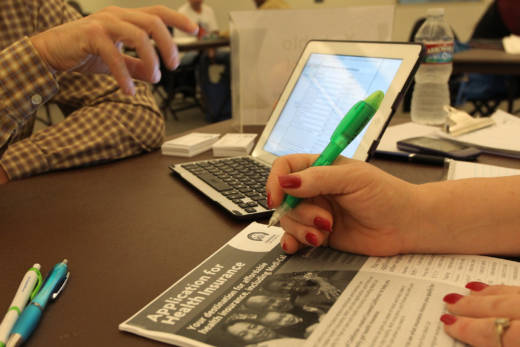Still, families are already dropping out of programs, even those that are not targeted by the draft rule, such as subsidies for school lunches, said Anna Dyer, director of services at the Second Harvest Food Bank in Santa Clara and San Mateo counties.
“It just has an incredible fear factor. People want to get away from anything that’s associated with public benefits,” said Dyer. “But we're afraid of the health repercussions if they don't get the healthy food they need.”
The public charge rule could trigger a big disenrollment from safety net programs that health and social service providers in California have worked for years to promote, said Michael Fix, a researcher with the Migration Policy Institute.
Fix believes the reaction among immigrants could be similar to what happened after the passage of the 1996 welfare reform act.
“We found the impact on immigrants was not just broad but it had unanticipated outcomes,” he said. “By that I mean, populations that weren’t the target of the law disenrolled from public benefit programs out of fear and confusion.”
Fix estimates only about 26,000 non-citizens in the Bay Area today depend on the government for cash assistance — Supplemental Security Income and Temporary Assistance for Needy Families — and could currently be considered a public charge by immigration officials.
But if the federal government expands the public charge test to Medi-Cal and food stamp users, thousands more immigrants could face difficulty if they apply for a green card. And uncertainty could lead as many as one million people in the region to consider abandoning programs they are eligible for, said Fix.
“What we're talking about here is people who live in family situations that would be likely to feel the kind of chilling effects we saw with the 1996 law,” said Fix, who presented his findings at a meeting of dozens of county workers and non-profit service providers this week in San Mateo.
The proposed changes aim to “promote immigrant self-sufficiency and protect finite resources by ensuring that they are not likely to become burdens on American taxpayers," said Homeland Security Secretary Kirstjen Nielsen in a statement.
But that reasoning doesn’t make sense to Hope Nakamura, an attorney who runs the public benefits practice at the Legal Aid Society of San Mateo County.
“These support programs that they’re trying to add to the public charge roll actually help families in the long run become self-sufficient,” Nakamura said.
“I have many years of experience seeing immigrant families who relied on public benefits temporarily because of an injury or becoming unemployed, and then they become self-sufficient citizens in our community,” she said. “Their kids graduate from UC Berkeley.”
The public can weigh in on the proposed rule until Dec. 10. Already, 46,200 comments have been submitted.
Unauthorized immigrants are not eligible for most taxpayer-funded benefits.
